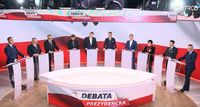On Friday, May 9, 2025, a highly anticipated presidential debate organized by conservative stations TV Republika, TV wPolsce24, and TV Trwam kicked off at 8:00 PM, featuring ten candidates vying for the presidency. Notably absent from the studio were prominent figures Rafał Trzaskowski and Magdalena Biejat, while Maciej Maciak did not receive an invitation to participate in the event.
This debate took a unique format, diverging from the traditional question-and-answer style typically seen in political forums. Instead of journalists, the candidates faced inquiries from a panel of experts, including InPost CEO Rafał Brzoska, constitutional expert Prof. Ryszard Piotrowski, and President of the Supreme Medical Council Łukasz Jankowski. The panelists posed pressing questions regarding key issues affecting the Polish populace.
Brzoska opened the discussion by addressing topics such as deregulation, the potential lowering of the retirement age, and incentives to encourage longer working lives. He also introduced the '1 for 2' rule, which stipulates that for every new regulation introduced, two existing regulations must be eliminated. This approach aims to streamline bureaucracy and enhance efficiency in governance.
Following Brzoska’s questions, Łukasz Jankowski turned the focus to the healthcare system, asking candidates how they plan to improve health security for Polish citizens. His inquiry came in light of ongoing concerns regarding the state of healthcare in Poland, a topic that has sparked considerable debate among voters.
During the debate, a notable moment arose when candidate Sławomir Mentzen expressed frustration over the lack of a visible timer for responses, stating, "We don’t have a clock. Our opponents have a clock behind the camera." This comment highlighted the logistical challenges faced during the debate. Fellow candidate Karol Nawrocki echoed Mentzen's concerns, prompting the hosts to assure candidates that a countdown clock would soon be visible.
Katarzyna Gójska, a journalist from TV Republika, confirmed, "In half a minute, at the request of Mr. Sławomir Mentzen, the clock will be turned on." Michał Adamczyk from TV wPolsce24 also noted that Nawrocki was similarly without a clock, underscoring the technical difficulties that can arise in live broadcasts.
In a parallel debate on the same network, journalist Stanowski made headlines by proposing a satirical program titled "a hat for everyone" if he were to become president. This proposal was a stark commentary on the dire state of healthcare in Poland, where many patients struggle to receive timely medical attention.
During this debate, Jankowski revealed that the National Medical Council (NRL) had reached out to all presidential candidates to inquire about their visions for healthcare financing and strategies to reduce waiting times for medical services. However, he noted that the council had not received any responses from the candidates, prompting him to directly ask them about their initiatives for enhancing health security for Polish citizens.
Stanowski took the opportunity to lampoon the healthcare system's shortcomings, stating, "This health service is already bankrupt. If something happens to you that requires medical intervention, you’ll realize that the system doesn’t work, and you might have to wait five years to get help, ideally dying in the meantime so as not to be a burden." His dark humor aimed at highlighting the absurdity of the current healthcare situation resonated with many viewers.
He continued, "My program is 'a hat for everyone' – you’ll get a hat and can beg on the streets of Polish cities. You won’t need to write online to celebrities to raise money for your treatment; you’ll take matters into your own hands. Maybe someone will throw a few coins into your hat, and somehow you’ll get treated." This ironic proposal underscored the frustrations many Poles feel regarding the healthcare system.
The debates have sparked a significant public response, with many citizens expressing their opinions on social media and during community discussions. The absence of major candidates like Trzaskowski has also raised eyebrows, leading to speculation about the impact of their non-participation on their voter base.
As the election approaches, the discussions around healthcare and the economy are becoming increasingly central to the candidates' platforms. With the public's growing discontent over the current state of affairs, how candidates address these issues could greatly influence their chances at the polls.
In summary, the debates have not only provided a platform for candidates to outline their visions but also highlighted the pressing issues facing Polish society, particularly in healthcare. As the election date draws closer, voters are keenly observing how these discussions will shape the political landscape and their future.

